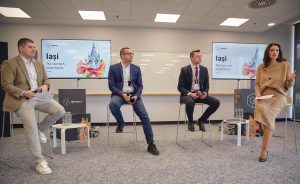EIT Health Study: Healthcare labor market calls for immediat AI skills

A recent report by EIT Health and McKinsey on „Transforming the healthcare industry through AI: the impact on the workforce and organizations” highlights the urgent need to attract, educate and train a new generation of healthcare professionals in data processing over time. What we will need to improve the skills of the current workforce, to fully exploit the potential for change offered by Artificial Intelligence (AI).
- The global economy could create 40 million new jobs in the health sector by 2030, but by then, there will be a shortage of 9.9 million doctors, nurses and midwives worldwide, according to the World Organization. of Health (WHO)
- According to the EIT Health and McKinsey report, Artificial Intelligence has the potential to revolutionize the medical field by achieving better results in the healthcare process, in optimizing the patient experience and access to health services, while improving the productivity and efficiency of healthcare services. care. The report states that basic digital skills, biomedical and data science, data analysis and the fundamentals of genomics will be key elements if AI and machine learning technologies are introduced into health services and support the workforce in the field.
- Three successful Romanian projects supported by EIT Health programs, XVision and Chifor Research startups, as well as a trans thoracic ultrasound interpretation system developed by the Technical University of Cluj-Napoca, use Artificial Intelligence to improve medical services.
The new EIT Health and McKinsey report resonates with the Agenda for Skills in Europe, presented by the European Commission on 1 July 2020. According to the Agenda, at least 85% of jobs currently require some degree of digital competence, while only 56% of adults had a minimum of basic digital skills in 2019. Between 2005 and 2016, 40% of new jobs jobs came from digital-intensive sectors. As Europe embarks on the road to recovery, the need to improve and adapt skills is high – and this resonates with the findings of the EIT Health and McKinsey report to encourage the application of AI solutions in healthcare. According to the report, basic digital skills, biomedical and data science, data analysis and the fundamentals of genomics will be key elements if AI and machine learning technologies are introduced into health services.
“These disciplines are rarely taught in parallel with traditional clinical sciences, in a systematic way. Thus, without her guilt, the workforce currently working in the field of health is not yet ready for the adoption of artificial intelligence. At the forefront of healthcare innovation in Europe, we are seeing the emergence of an increasing number of AI solutions with proven impact and applicability. However, we need to combine new technologies that can reduce the pressure on health services with the ability to integrate them into the healthcare delivery system. Now is the time to close the gaps so that Europe does not lag behind in the application of artificial intelligence tools, ”said Jorge Fernández García, Director of Innovation, EIT Health and co-author of the report.
Read the full report here: https://eithealth.eu/our-impact/our-reports/












